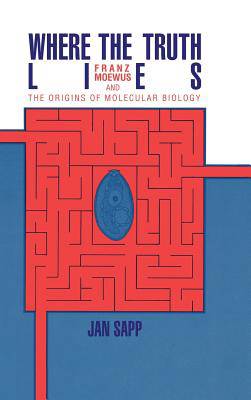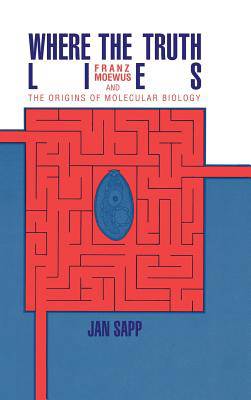
- Retrait gratuit dans votre magasin Club
- 7.000.000 titres dans notre catalogue
- Payer en toute sécurité
- Toujours un magasin près de chez vous
- Retrait gratuit dans votre magasin Club
- 7.000.0000 titres dans notre catalogue
- Payer en toute sécurité
- Toujours un magasin près de chez vous
Where the Truth Lies
Franz Moewus and the Origins of Molecular Biology
Jan Sapp
Livre relié | Anglais
123,95 €
+ 247 points
Format
Description
This absorbing account of a case of suspected fraud involving the tragic career of the molecular biologist Franz Moewus illustrates all that can go wrong in scientific knowledge-making. The author follows Moewus' meteoric flight among the greatest scientists of the twentieth-century, to his denunciation as the perpetrator of one of the most ambitious cases of fraud in the history of science. He discusses the socio-political issues that helped to bring Moewus' work to the center of great scrutiny in the professional biological science community, how the controversy was sustained for decades, and how it came to a close and was eventually expunged from the history of science. The author reopens this case and writes Moewus into the history of modern science, not in an attempt to vindicate him, but to present the methodological lessons that the controversy reveals to both scientists and science analysts. Arguing against the existence of institutionalized rules and of a universal efficacious scientific method, Professor Sapp demonstrates how what counts as evidence is negotiated by science, and he reveals the difficulties scientists face in objectively testing the validity of scientific results. By likening scientists to storytellers, the author emphasizes the creative nature of science, the rhetorical nature of scientific reports, and the fictitious elements inherent in the construction and maintenance of scientific knowledge-making and knowledge-breaking claims. Undergraduate and graduate students and professional researchers in the history and philosophy of science and experimental biology will find this a thought provoking and informative historical account.
Spécifications
Parties prenantes
- Auteur(s) :
- Editeur:
Contenu
- Nombre de pages :
- 352
- Langue:
- Anglais
Caractéristiques
- EAN:
- 9780521365505
- Date de parution :
- 27-07-90
- Format:
- Livre relié
- Format numérique:
- Genaaid
- Dimensions :
- 155 mm x 234 mm
- Poids :
- 589 g

Les avis
Nous publions uniquement les avis qui respectent les conditions requises. Consultez nos conditions pour les avis.






